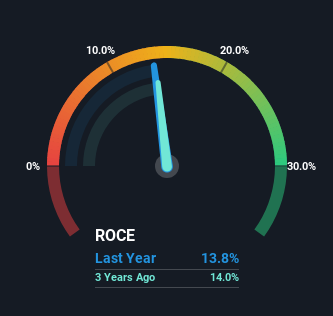- United States
- /
- Beverage
- /
- NYSE:SAM
Investors Could Be Concerned With Boston Beer Company's (NYSE:SAM) Returns On Capital

If we want to find a potential multi-bagger, often there are underlying trends that can provide clues. One common approach is to try and find a company with returns on capital employed (ROCE) that are increasing, in conjunction with a growing amount of capital employed. Put simply, these types of businesses are compounding machines, meaning they are continually reinvesting their earnings at ever-higher rates of return. However, after briefly looking over the numbers, we don't think Boston Beer Company (NYSE:SAM) has the makings of a multi-bagger going forward, but let's have a look at why that may be.
Understanding Return On Capital Employed (ROCE)
For those that aren't sure what ROCE is, it measures the amount of pre-tax profits a company can generate from the capital employed in its business. To calculate this metric for Boston Beer Company, this is the formula:
Return on Capital Employed = Earnings Before Interest and Tax (EBIT) ÷ (Total Assets - Current Liabilities)
0.14 = US$154m ÷ (US$1.4b - US$264m) (Based on the trailing twelve months to September 2024).
Therefore, Boston Beer Company has an ROCE of 14%. In absolute terms, that's a pretty normal return, and it's somewhat close to the Beverage industry average of 17%.
See our latest analysis for Boston Beer Company

Above you can see how the current ROCE for Boston Beer Company compares to its prior returns on capital, but there's only so much you can tell from the past. If you'd like to see what analysts are forecasting going forward, you should check out our free analyst report for Boston Beer Company .
So How Is Boston Beer Company's ROCE Trending?
On the surface, the trend of ROCE at Boston Beer Company doesn't inspire confidence. To be more specific, ROCE has fallen from 19% over the last five years. However it looks like Boston Beer Company might be reinvesting for long term growth because while capital employed has increased, the company's sales haven't changed much in the last 12 months. It's worth keeping an eye on the company's earnings from here on to see if these investments do end up contributing to the bottom line.
The Bottom Line
Bringing it all together, while we're somewhat encouraged by Boston Beer Company's reinvestment in its own business, we're aware that returns are shrinking. And in the last five years, the stock has given away 16% so the market doesn't look too hopeful on these trends strengthening any time soon. All in all, the inherent trends aren't typical of multi-baggers, so if that's what you're after, we think you might have more luck elsewhere.
If you'd like to know about the risks facing Boston Beer Company, we've discovered 1 warning sign that you should be aware of.
If you want to search for solid companies with great earnings, check out this free list of companies with good balance sheets and impressive returns on equity.
Valuation is complex, but we're here to simplify it.
Discover if Boston Beer Company might be undervalued or overvalued with our detailed analysis, featuring fair value estimates, potential risks, dividends, insider trades, and its financial condition.
Access Free AnalysisHave feedback on this article? Concerned about the content? Get in touch with us directly. Alternatively, email editorial-team (at) simplywallst.com.
This article by Simply Wall St is general in nature. We provide commentary based on historical data and analyst forecasts only using an unbiased methodology and our articles are not intended to be financial advice. It does not constitute a recommendation to buy or sell any stock, and does not take account of your objectives, or your financial situation. We aim to bring you long-term focused analysis driven by fundamental data. Note that our analysis may not factor in the latest price-sensitive company announcements or qualitative material. Simply Wall St has no position in any stocks mentioned.
About NYSE:SAM
Boston Beer Company
Produces and sells alcohol beverages primarily in the United States.
Flawless balance sheet and slightly overvalued.
Similar Companies
Market Insights
Community Narratives


